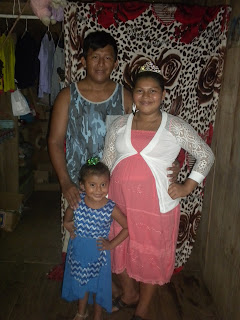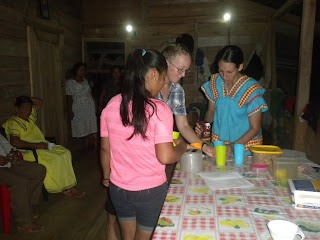Like a few other individuals in Quebrada Pastor, I wanted
to shine the spotlight on Willy, who has also played a huge role in my life
here.
Willy has a fascinating story, and one I know well. After all, his family was my host family, so
I lived with them for my first three months, and I still see them, hang out at
their house, and do work with them all the time. We work together on aqueduct issues (he’s the
president of the school aqueduct water committee), he enthusiastically helps me
with trainings that I host for Volunteers and for the community, he loves
helping me host visitors, and I help promote his business.
For a 24-year-old, he’s incredibly accomplished. He just officially registered his business, Heidy
Organic Chocolates, a year ago, and has regular clients all over the Bocas
Islands, expanding into other provinces in Panamá, and occasionally buyers from
other countries. That’s pretty darn
impressive for a guy who runs his business in his family’s house, usually just
with the help of his wife and another person or two, making chocolates by hand
without any electricity whatsoever (unless you count the solar-panel-powered
lamp that allows them to make chocolates sometimes until 3:00 am).
He is passionate about his business because he is
passionate about his home. He was raised
by his dad and his grandmother, but when she died, Willy was 12, and his dad’s
muscular dystrophy caused him to deteriorate rapidly thereafter, so Willy
became the sole caregiver for his dad, at the same time he was attending high
school and working at a store in Almirante to support the two of them. He was forced to grow up fast. He’s an unusually fast learner (he picked up
speaking some Mandarin just by working at the Chinese-owned store, and he
learned how to survey with an abney level faster than some Peace Corps
trainees), and he was almost always the best student in his class, with a
never-ending appetite for learning.
Though he was offered special study abroad opportunities as far away as
Ecuador and France, he chose to stay in Quebrada Pastor to care for his
wheel-chair-bound father – which also excluded attending university to study
science and become a professor, as he had wanted. So he turned his energy and ambition to
making a better life in Quebrada Pastor.
He married Mechi and they had a daughter, Heidy. Then he turned his high-school business
degree – with his daughter as inspiration – to the creation of Heidy Organic
Chocolates. Though at first he and Mechi
were working his father’s land to grow cacao and other produce to sell in
Almirante, his business instinct led him to improve upon this model – Why sell
cacao beans to the cooperative if you can process them into a consumer product
– bars of baking chocolate – and sell that directly to customers, maximizing
your profit? And why sell cacao bars
in Almirante when you can get a better price selling them to tourists on the
Bocas Islands? And isn’t it easier and
more reliable to sell to regular clients (the tourist industry), ensuring a
consistent demand, than just selling to random tourists on the street? And what if he could make other cacao
products that consumers want, like cocoa powder, cocoa butter, dark chocolate
candy bars, and cacao nibs? So with his
charisma and work ethic, he built a network of clients – hotels, restaurants,
and stores – and reliably followed through on delivering their orders each
week.
Calling the business Heidy Organic Chocolates was no
accident – he had been thinking about the future from the beginning – he wanted
this to provide Heidy with the opportunities he had wanted as a child. And he wanted to do so in a sustainable,
responsible way. He is well-versed in
the concepts of sustainable agriculture, organic produce, and fair trade, and
uses these both to guide his business model and to promote his products to
consumers. His vision is
community-oriented; he hopes that one day, the associates of the business –
fellow community members – will share in the work of running the business and
in the profits, benefitting other families of Quebrada Pastor. He hopes that, with more help, they’ll be
able to produce more cacao products and host cacao tours for visitors. He hopes that when the business becomes truly
profitable, they can invest in the Quebrada Pastor school and other community
projects – that it can be a force for community-run development, and an impetus
to improve the community – say, through better solid waste management, an
example he often cites as a priority.
And to me, community-initiated, community-funded, and
community-run development is indeed an appealing thought.
So even though I have no expertise in business or
marketing or tourism or agriculture or food products (well, except for my
ability to consume chocolate) – I agreed that I would help however I
could. So I connected him to the Peace
Corps network – which helped him sell to eager new clients (Volunteers all over
Panamá) and opened up opportunities to connect with new clients owning stores
and restaurants in other parts of Panamá.
I’ve helped orchestrate trainings by agro-business and cacao
Volunteers. I’ve tried to provide some
ideas, or at least be a sounding board for his creativity. I’ve facilitated communication, sometimes
through translation, and encouraged setting up systems to make transactions
easier. And I’ve been his promoter,
following up leads from other Volunteers, inviting friends to go on his cacao
tour to give him practice, brainstorming and helping pursue ways to raise money
to invest in growing his business.
To that end, I’m always looking to connect him to new
resources – be that potential clients, sources of grants and funding, more
information about business and cacao products, agro-business training
opportunities, or people who want to go on a cacao tour – so if you know of
something that could be helpful, please let me know. Or better yet, let him know yourself, at heidyorganicchocolates@hotmail.com
or Heidy organic chocolates on Facebook, or even his website when he gets that
up and running.
And do let me know if you want me to bring you any cacao
when I return to America in September… J I hope by the time I’ve run out of my supply,
he’ll be shipping chocolate directly to me in the States!
--
Pictures:
Willy loves giving cacao tours. Every time I have visitors, we go on a tour -- and he's been improving the content each time. Little-by-little, he's been increasing the amount of English he uses in the tour. He's getting ready for a legitimate ecotourism aspect to his chocolate business!
From some of the more recent tours:
(He doesn't let tour participants cut open cacao pods with machetes anymore. Probably wise. We'll call that a win for teaching about America's (litigious and liability-oriented) culture.)
Willy's tour was part of Tech Week last year!
Willy also loves the opportunity to share food with visitors, which he likes to include in the tour.
--
The Business:
From the official founding of the company, with its associates
Some of the lovely lady associates of the business, including his wife, and my good friend Nayelis (who has been working for Willy to save up for college next year).
Preparing the scene for the cacao photo shoot -- Willy had a WWOOF Volunteer for a few months, who has been helping him set up a website and continue developing his ecotourism component.
--
Willy has been involved in every seminar we've done in Quebrada Pastor -- here's a few:
Willy helped organize the Project Management and Leadership Seminar for several leaders in the community - and still cites things from the Seminar that have helped him be a more organized and better leader
And he hosted a cacao grafting training - given by an Agriculture Volunteer.
Willy was the only person from the all aqueduct groups in the community I worked with who wanted to learn how to use the abney level for surveying -- and then mastered it quickly -- to help gather information about the school aqueduct for making repairs
--
Celebrations! Willy is always pleased for me to make a birthday brownie cake (using his chocolate, of course), or to take part in whatever silly American traditions I come up with...
Heidy's 3rd birthday
New Years 2016
Mechi's 20th birthday
On a family outing, harvesting oranges and lemons and cacao, during my first month
Celebrating Rosh Hashana 2014 with Willy's dad, Bernardo
Everyone enjoyed the apples and honey -- and the Hebrew prayers.
Willy really got into taking the pictures for the scavenger hunt from Passover 2015
It's been a lot of fun working and playing together!

























